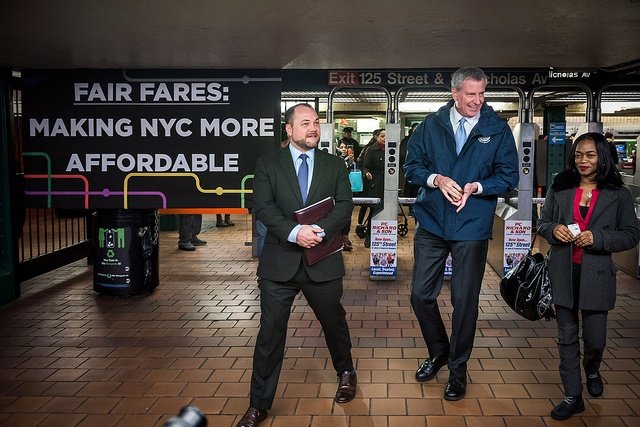After Botched Rollout, Only A Fraction Of Poor NYers Will Have Access To Fair Fares
Jan. 4, 2019, 5:11 p.m.
'It is good to see the mayor taking this first step...but talk doesn't get you through the turnstile,' one advocate said.

Mayor Bill de Blasio and Council Speaker Corey Johnson hold a joint appearance to announce the details of a half-priced MetroCard program.
Facing mounting criticism over the delayed rollout of the Fair Fares program, on Friday Mayor Bill de Blasio and City Council Speaker Corey Johnson announced the first step in providing some low income residents with half-priced MetroCards. But the initiative, which secured over $100 million in funding in last year's budget, will initially serve less than four percent of the estimated 800,000 New Yorkers living below the federal poverty line.
During a press conference at the Harlem 125th Street subway station, the mayor celebrated the launch of the program, even as he shared the podium with disgruntled advocates and councilmembers. "You’re building the airplane while it's going down the runway," de Blasio explained. "Doing this much six months after starting from scratch—it shows our commitment to keep going."
De Blasio, formerly a staunch opponent of Fair Fares, was joined by a range advocates who've helped champion the proposal, including leaders of the Community Service Society and the Riders Alliance, as well as few hecklers. In his remarks, Community Service Society President David Jones thanked Speaker Johnson for his support, before launching into a blistering attack on the mayor for his apparent disinterest in the program.
"It is good to see the mayor taking this first step...but talk doesn't get you through the turnstile," Jones said. "It takes a process that makes it easy for people to sign up and get their card. It takes an extensive outreach effort—like what was done for Pre-K and paid sick days—to let people know about it, and how to apply. And it takes a concrete timeline that doesn't leave hundreds of thousands of poor people waiting for a program that is coming at some unspecified time in the distant future."
According to City Hall, the first batch of discounted cards will be available to an estimated 30,000 New Yorkers who currently receive cash assistance benefits from the city. Those who qualify will get a letter in the coming days, followed by robocalls directing them to pick up the new MetroCard at a designated office within their borough. At first, only 7-day and 30-day passes will be offered, which will cost $16 and $60.50, respectively.
The second phase of the program is set to begin in April, the city said, when 130,000 recipients of federal SNAP benefits will be notified of their eligibility. By then, the city expects that low income riders will be able to sign up for the service online and receive the cards in the mail. Officials are also confident that a single-ride option will be available in April.
It's unclear how and when the city will reach out to the remaining 640,000 impoverished New Yorkers who were expected to be included in the program—a group that includes many undocumented immigrants who are prohibited from receiving federal benefits.
Seriously, what is going on in the mayor’s office on #FairFares? He’s had months to figure it out — after months of negotiations that preceded the @NYCCouncil landmark vote. What was all that talk for? Now he wants to jettison the immigrant NYers he claims to support? No.
— Francisco Moya (@FranciscoMoyaNY) January 4, 2019
Asked repeatedly about the city's choice to launch the program in limited tranches, and why New Yorkers had not been notified about the change of plans ahead of the January 1st deadline, the mayor replied, "People estimated six months to get it up or running—not utopia. It's valuable to have a first group to test to make sure the programs work."
For his part, Council Speaker Johnson, who led the negotiations with de Blasio, seemed willing to at least acknowledge that the program had stumbled out of the gate.
"Could it be more perfect? Yes," he conceded. "The mayor and I can always Monday morning quarterback and figure out ways we can get it done in a better way. We are excited that today is a day where people living in poverty are going to be able to move forward."